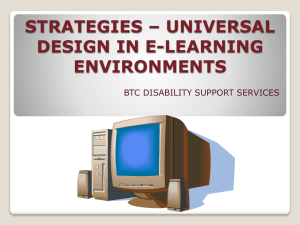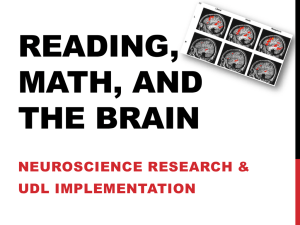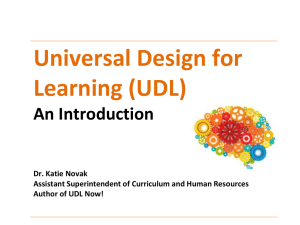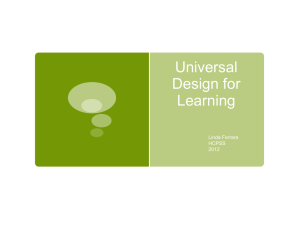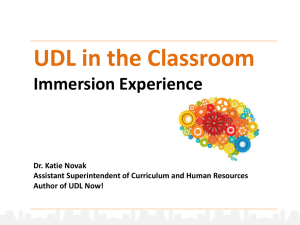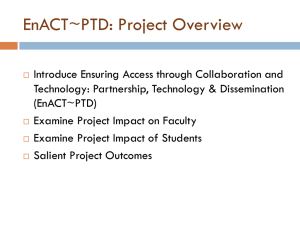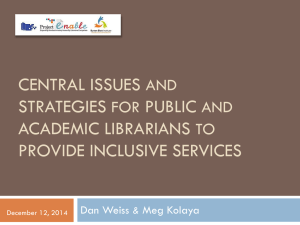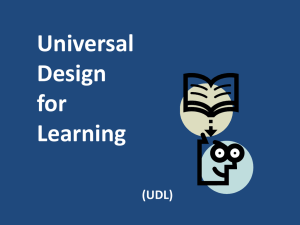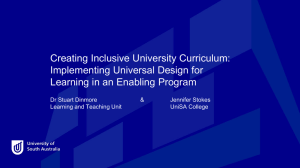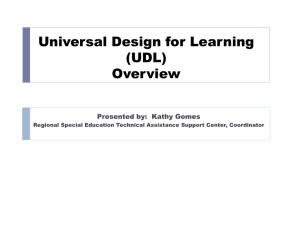Easily Adaptable UDL Approaches for any Class
advertisement
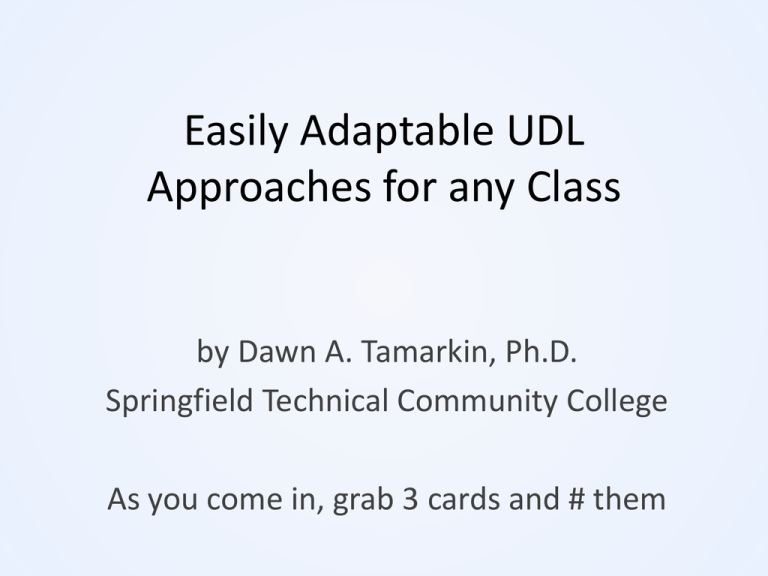
Easily Adaptable UDL Approaches for any Class by Dawn A. Tamarkin, Ph.D. Springfield Technical Community College As you come in, grab 3 cards and # them Abstract: A number of universal design for learning (UDL) approaches will be shared that can be readily incorporated into other classes. Some simple options as well as more complex ones will be offered. These UDL approaches have been developed over the past 15 years by the presenter and other STCC faculty. Get a comic square • Find the people with the other squares that match yours • Get your squares into order • Introduce yourselves to each other • Be ready to read your comic aloud and introduce your partners Introduction What is Universal Design for Learning? 1 I am quite familiar with UDL 2 I am only a little bit familiar with UDL 3 I know relatively little about UDL No Worries! • • • • It’s easy It’s fun Even UDL-pros are always learning about it I use a more applied approach, so even if you are very familiar with it, I may get you thinking about it differently About UDL… • It helps you address more learners, like: – students with physical/learning disabilities – students with diverse learning styles – students who learn differently than you do – students who feel like they don’t fit in – non-native English speakers • It’s a method to have a more inclusive class • It prevents singling out particular learners • It tends to be more active and flexible How do you do it? An oversimplification is to: • Consider one particular type of learner and consider what they couldn’t do in your class (e.g., a blind student) • Conversely, consider a challenging topic and come up with a new way to teach it to a student who should have been able to master it • Create a more inclusive / active atmosphere • see UDLcenter.org UDL Example Example: How can a student who cannot take notes get notes? • Introduce yourself to the person next to you • Ask each other to answer the topic question • Consider ways you have done or seen/heard of done • Come up with new ways • You have 2 minutes Go! Stop! 11 Time to share 1 Pick me! 2 Pick me if no one holds up a 1 3 Please don’t pick me 12 Possible solution #1 • Record your classes • I do both a voice and a video recording using Mimio and Camtasia • It can be time consuming for you • Only dedicated students use it • Example recording… Possible solution #2 Low-tech method: • Assign note-takers • Have them use carbon paper • Make the notes available to everyone • Example notes… How is note-taking a UDL approach? 1 It offers alternative modes of representation 2 It provides for students who cannot take their own notes 3 It does not single out students with disabilities Class Community as UDL Create Class Community • May seem “touchy-feely” to some of you • The stronger the inherent support, the more accepted and comfortable students are; this promotes learning • Leads to more study groups and outside support • Includes professor as part of the team • Reduces student anxiety • Gives students a sense of belonging (to the learning environment) Methods for Community Development • Ice breakers (e.g., Comic Strip Chaos) • Group work, especially where groups change • First day of class activities (Linda Meccouri at HCC has an excellent one) • Valuing individual contributions and diversity • Critical Incident Questionnaires with revealed feedback • Quick discussion with classmates on topic (e.g., after a 1,2,3 card question) • Teaching studying/learning methods • UDL activities, where everyone is included Another ice breaker-type activity • This one is good for introducing new topics • Toss the papers around until I say “stop” • People with papers come up front (or hand off to a neighbor if uncomfortable) • With the help of everyone sitting down, rearrange yourselves to form an appropriate sentence related to today’s topic Go! What did we come up with? Making group / discussion more UDL • Consider defining roles within a group, like: – moderators (to make sure everyone gets to participate) – note-takers – time keepers – reporters • Ask for all students to contribute to a discussion – anonymous note papers and random choices – include an individual step, like write down a thought first, before talking CIQ Some answers: 1: • I feel engaged when you ask questions and 4: • the only reason why things are puzzling we respond with the cards. I also prefer your and confusing is because i really haven’t drawings and explanations over the books had the time to study the material and diagrams. learn it. 2: • I feel distance on Fridays and every other • I find some of your quizzes to be a bit Monday when I come to class after working confusing for me at times, I guess the way 12hrs. I have a very hard time focusing. you word your questions • When I get stuck out of my preferred seat 5: • how little people study and expect to • when you are going thru the text book get into a program with a Cpictures quickly • What surprised me the most is that I 3: • I love the fact that your lectures are always actually pricked my finger for a lab, and it recorded & your board drawings or information are wasn't even that bad! always recorded as well right along with your 6: • On a side note, I feel that Dr. lectures, so it's like being in class all over again. Tamarkin is generally a good dresser and • The more pictures you draw in notes, the better. has nice teeth. This is the only class where notes are available in • I like the studying ideas you suggest several forms and by other students; it's helpful to they are helpful. I never really found a compare what they found important during lecture way that really helps me to study but to my notes and add theirs. some of your ideas seem useful. Preparing for tests as UDL Preparing for tests • Many students lack study/organization skills • No teachers enjoy providing “review sheets” • You can have them practice (model) building their own study sheets and reviewing • How is this UDL? You are – guiding appropriate goal setting – optimizing individual autonomy – facilitating their management of information and resources Detailed Table of Contents • As they go through, they are self-testing • They are also learning how to spend their time on what they have not yet mastered developed with Vanessa Hill • First have them cross off anything they are not responsible for • Then have them explain what is in each heading & subheading Fitting in this exercise… 1 … would take too much class time 2 …is something I can squeeze in 3 …is not my responsibility (they should know this already) Peer support rounds • Post Major Topics around the room • Have students identify their comfort level with the topics (from 1 to 5, for example) • Assign a student who wrote a 1 to each Major Topic location • Unassigned students roam around to get help where they most need it • Switch assigned students to a second set developed by Diane O’Hearn at GCC Manipulatives as UDL Including Manipulatives • • • • Kinesthetic learners will be engaged Interpersonal learners will be engaged Can be more challenging to implement Should be considered Simplify and build the structure Dynamic Cell Models Elodea cell modeled from microscope view: Challenging Content presented as UDL Sequencing, sorting, organizing • Get students to sequence relevant information • Have students sort information into similar/different piles • Use that to get students to make concept maps • Provide concept maps for challenging topics • Provide an outline for your lecture / lab Sequencing Mitosis • I developed Mitosis Sequencing Kits, but this could be done with any images • By putting the images in order, the process becomes clear • Students speak the language of mitosis aloud while trying to sequence Term Sorting Providing a concept map / flow chart Analogies & Applications • Optimizing relevance, value, and authenticity is an important UDL guideline • These are alternative options for representation • Rather than repeating the information you offered, provide it alternatively using an analogy or application Now you come up with an analogy or application you used this week in class… You have 1 minute! Time to share 1 Pick me! 2 Pick me if no one holds up a 1 3 Please don’t pick me 40 Wrap Up Final Thoughts • Any time you try to include everyone, you are attempting a UDL approach • Active and interactive approaches are often UDL • I chose not to discuss changing our own ways of presenting material (day in / day out), since that is hardest to change • My students are much more appreciative of me and assume more responsibility for their work I can use some of these ideas in my classroom! 1 Definitely 2 Maybe 3 Not really People at STCC who have contributed: • • • • • Vanessa Hill (math) Carol Roberts (psychology) Cathy Beals (biology) Connie Hackett (disability services) Michele Nash (biology) Others who have contributed: • Philomena D'Alessandro (math at QCC) • Diane O’Hearn (college success at GCC) • Mary Moriarty (at NSF / Smith College)
